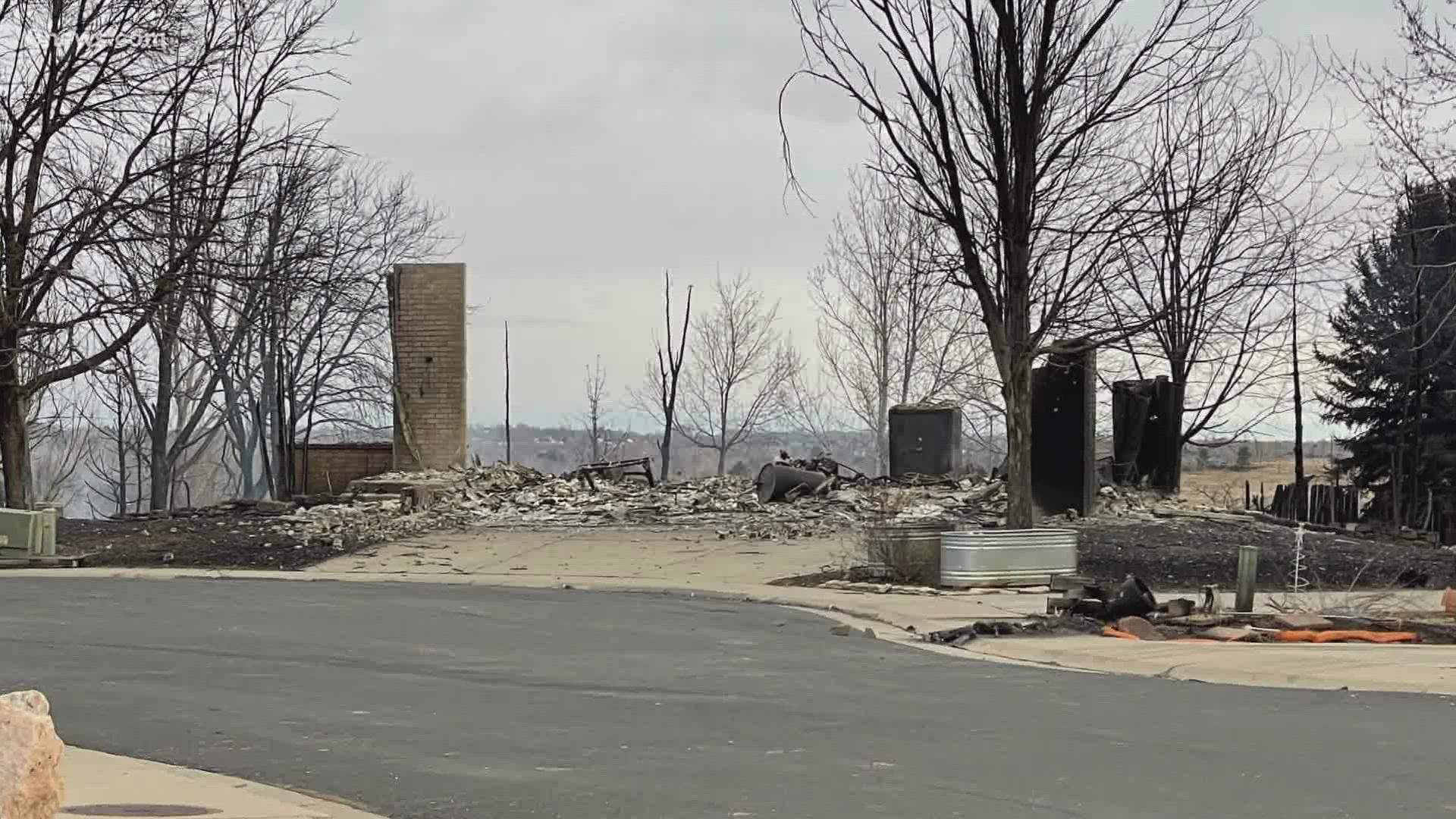LOUISVILLE, Colo. — People in Louisville who lost a home in the Marshall Fire are fighting a new building code. They worry it will make rebuilding more expensive when so many are already severely underinsured.
There's a lot of confusion about the cost of meeting these rules, which are meant to make homes greener. In mid-October, the city council adopted an ordinance that included the 2021 International Energy Conservation Code (IECC). The code requires new buildings to be built with certain standards, which include electric vehicle charging stations and the ability to support solar panels.
During a city council meeting on Feb. 1, a consultant that worked with two local home builders said an analysis concluded homeowners would pay a minimum of $20,000 more to build a home under the 2021 code over the 2018 code.
Liz Landwehr, whose home was consumed by the Marshall Fire, said builders are giving her quotes that are much higher than that. She thinks it will cost her around $100,000 to meet the 2021 code.
Landwehr supports keeping the standards for new builds, but she's hoping the city will not require fire survivors who are rebuilding a home to follow the 2021 code.
"We are all trying to come back to the community," she said. "All of our neighbors that are underinsured, it is exacerbating the issue around underinsurance and supply chain issues."
The state said the additional costs to meet the energy code will be less than $5,000.
Landwehr continues to hear different quotes, and that is making this process even more confusing and frustrating. Quotes from the state are a fraction of the cost Landwehr said she's getting from builders in the area, including an estimate from the Home Builders Association of Metro Denver.
Pacific Northwest National Laboratory (PNNL), which the Colorado Energy Office calls the gold standard for providing data on IECC building code costs, estimated the difference between complying with the 2018 versus 2021 code was $4,789. Colorado Energy Office said this number included a nearly 20% inflation rate to factor in a rise in building costs.
Colorado Energy Office requested analysis from PNNL after they said there was growing concern that earlier estimates exaggerated and overinflated some of the costs.
Green builders in the Denver metro area said this estimate from the state feels accurate.
"Most construction companies and builders aren't that familiar, or it is not their practice to build this energy-efficient home, so they are looking at these add-ons and treating them as add-ons," said Steve Rouisse with Fuentesdesign.
Building energy-efficient homes is what Rouisse and his coworker, Brian Fuentes, do. They suggest homeowners go to green builders to get a much cheaper quote.
"If you truly start from scratch and come up with a plan that is optimized for performance, I think you can do that at no additional cost," Fuentes said. "I understand the frustration from homeowners because they go out and go to builders in the marketplace, and they say, well I don’t know how to do that and I'm going to put a big price tag on it because it is going to be a huge learning curve."
According to the Colorado Energy Office, the upfront costs to meeting the energy code will be less than 2% of the overall building cost.
"This is our opportunity to build the best, most energy efficient, healthiest home possible in the most affordable way for victims of the fire," said Christine Berg, a senior policy advisor at the Colorado Energy Office. "Higher-performance homes use less energy to heat and cool, have better air quality, are safer and more comfortable, have lower utility bills, are more resilient in the face of future disasters, and produce fewer carbon emissions. Building a high-performance home from the ground up can be cost effective and allows homeowners to take immediate advantage of rebates and incentives."
According to Berg, any out-of-pocket costs to meet the code for Marshall Fire survivors will be taken care of through up to $37,750 rebates from Xcel, equipment discounts from manufacturers such as Mitsubishi, state funding and the Community Foundation Marshall Fire Resilient Rebuild Assistance Fund.
Homeowners still concerned about the cost of the building code
Landwehr still isn't confident in the estimate from the Colorado Energy Office because of the quotes she is getting from builders in the area.
"The homeowners that lost their homes need a break," she said.
People who lost their homes in the Marshall Fire rallied Sunday in hopes of pushing Louisville city council members to allow them to adhere to less strict codes passed in 2018.
Residents said they recently received a handout from the Home Builders Association of Metro Denver which estimated building code costs at a much more expensive rate than those offered by the state and city.
“That’s really the crux. Where’s the truth? We don’t know. I don’t think anyone truly has an answer,” Rex Hickman, a Louisville resident of 45 years, said at the rally. “Until we have an answer, it seems entirely unfair to impose that on people that involuntarily have to rebuild.”
On Tuesday, the Louisville City Council will discuss the 2021 code and whether to require fire survivors to follow it.
SUGGESTED VIDEOS: Marshall Fire Coverage

